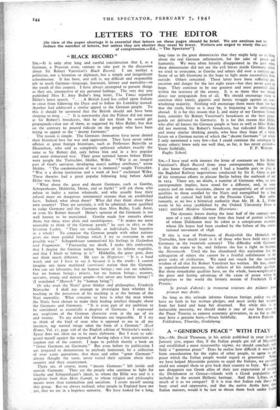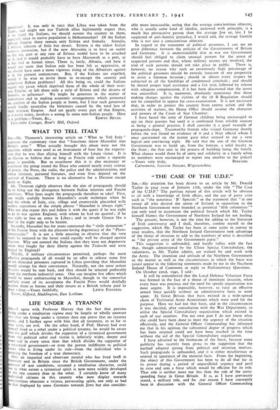A " GENEROUS PEACE " WITH ITALY
S1R,—Mr. David Thomson, in his article published in your issue d January 31st, argues that, if the Italian people got rid of Mussolini and established a more trustworthy regime, we should conclude with Italy a " generous peace." Does he realise how difficult it would be from consideration for the rights of other people, to agree to and peace which the Italian people would regard as generous? When we have helped Abyssinian patriots to expel the Italians, we certain!, could not compel them to give back their country to Italy. We could not disappoint our Greek allies of their just expectation of uniting the Dodekanese to Greece—islands with a Greek population not included in the ancient Hellenic heritage. And then Libya, or se much of it as we conquer? If it is true that Italian rule there h been cruel and oppressive, and that the . native Arabs hate then Italian masters, would it be lust to thrust them back under Pablo dominion? It was only in 1911 that Libya was taken from the Turks, and might not our Turkish allies legitimately expect that, if we expel the Italians, we should restore the country to them, especially since its native population is Mohammedan? Of the Italian African Empire there remain only Eritrea and Somalia. Somalia, I believe, consists of little but desert. Eritrea is the oldest Italian overseas possession, but if the new Abyssinia is to have an outlet to the sea, part at any rate of Eritrea would have to be attached to it, and it would probably have to have Massowah as a port, as it has had in former times. There is, lastly, Albania, and here it would not seem that Italian rule has been felt as oppressive, or we should have seen a more vigorous rising of the Albanians against it in the present conjuncture. But, if the Italians are expelled, would it be wise. to invite them to re-occupy the country and complicate Balkan problems? All this being so, could the Italians regard any peace which deprived them of the whole of their over- seas Empire, or left them only a strip of Eritrea and the deserts of Somalia, as geterous? We might be generous in the matter of indemnities and in making economic arrangements which promoted the comfort of the Italian people at home, but I fear such generosity would hardly neutralise the bitterness caused by the total loss of their overseas Empire. And yet nearly every part of that Empire, as it exists today, involves a wrong to some non-Italian people. Here
Is
a problem.—Yours, &c., EDWYN BEVAN. Yatscombe Cottage, Boar's Hill, Oxford.































 Previous page
Previous page